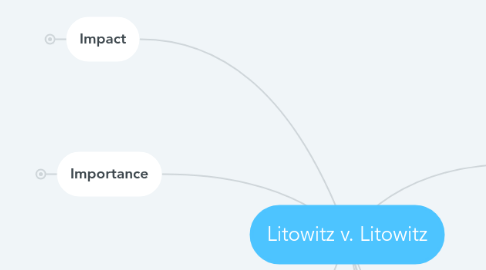
1. Impact
1.1. Davis v Davis The Tennessee Sumpreme Court laid a framework for deciding disputes between divorcing couples over frozen preembryos
1.1.1. The courts stated that disputes involvin the disposition of preembyos produced by in vitro fertilization should be resolved, first by looking to the preferences of the progenitors. If their wishes cannot be ascertained or if there is dispute, then their prior agreement concerning disposition should be carried out.
1.1.1.1. If no prior agreement exists, then the relative interests of the parties in using or not using the preembryos must be weighed.
1.1.1.1.1. The woman provided the egg and the man provided the sperm. One party wished to donate the preembryos to another couple and the other wished to discard them.
1.2. Kass v. Kass the New York Court of Appeals concluded the parties agreement to donate preembryos to an in vitro fertilization program for research purposes would control.
1.2.1. The woman wanted to implant the pre-zygotes to achieve another pregnancy. The man opposed any pregnancy and counterclaimed for specific performance of the agreement to allow the program to keep them for research.
1.2.1.1. The parties had signed four consent agreements provided by the hospital.
1.2.1.1.1. The significant one provided in part: In the event of divorce, we understand that legal ownership of any stored prezgotes must be determined in a property settlement and will be released as directed by order of court of competent jurisdiction. Should we for any reason no longer wish to attempt to initiate a pregnancy, we understand that we may determine the disposition of the frozen prezgotes remaining in storage.
2. Importance
2.1. Assisted Reproductive Technology (ART) has become a key health care concern
2.1.1. This case gives guidance to health care systems regarding the types of agreements they should make with parties seeking to utilize ART. Also, in the event there is no agreement this case gives some guidance on previous practice.
3. Influence
3.1. ART Agreements with parties have and will continue to be refined and strengthen to protect both parties involved as well as the clinic.
3.2. Recognition of parentage Act helps to scope responsible parents in efforts to forgo parentage claims later on.
4. Facts
4.1. Parties
4.1.1. David J. Litowitz (Respondent)
4.1.2. Becky M. Litowitz (Petitioner)
4.2. Background
4.2.1. Mr. and Mrs. Litowitz married in 1982
4.2.1.1. They already had one biological child together and two children from a prior marriage of Mrs. Litowitz.
4.3. What Happened?
4.3.1. Mrs. Litowitz was unable to have further children because of a hysterectomy after the birth of her third child.
4.3.1.1. In 1996, the couple consulted with the Center for Surrogate Parenting, Loma Linda University Gynecology and Obstetrics Medical Group to have another child by in vitro fertilization.
4.3.1.1.1. Five pre-embryos were created from the combination of donor eggs and Mr. Litowitz sperm.
5. Issue
5.1. Whether the Court of Appeals was correct when it affirmed a Superior Court award of two cryopreserved preembryos to Respondent David J. Litowitz in a parenting plan in a dissolution
5.2. Whether a motion by Respondent David J. Litowitz to submit additional evidence on review should be granted.
6. Rule of Law
6.1. Contract law was applied in this case
6.1.1. The contract provision signed by Mr. and Mrs. Litowitz and the Loma Linda Clinic under the heading legal status and dispositional choices stated that "We agree that because both the husband and wife are participants in the cryopreservation program , that any decision regarding the disposition of our pre-embryos will be made by mutual consent. In the event we are unable to reach a mutual decision regarding the disposition of our pre-embryos, we must petition to a Court of competent jurisdiction for instructions concerning the appropriate disposition of our pre-embryos.".
7. Analysis
7.1. Petitioner Becky M. Litowitz claims she has a contractual right to the cryopreserved in this case and that the Court of Appeals erred when it ignored her contractual right to them.
7.1.1. She maintains the egg donor contract gives her and the Respondent equal rights to the preembryos. She argues that a biological relationship should not be the only factor used in determining whether she has a right to them.
7.2. Respondent David J. Litowitz argues the egg donor contract does not provide for disposition of the preembryos to Petitioner. He claims there was no specific provision in that contract relating to disposition of the preembryos or disposition in the event of divorce.
7.3. The Court of Appeals concluded there was no express agreement to enforce because under the contract Petitioner and Respondent are required to petition the court for instructions only in the event they could not reach a mutual decision concern disposition of the preembryos.
7.3.1. It is obvious that Petitioner and Respondent have not reached a mutual decision regarding disposition of the preembryos. Because they have not, it is appropriate for the courts to determine disposition of the preembryos under the cryopreservation contract.
7.3.1.1. The contract signed on March 25, 1996, provided for disposition of the Litowitzes two remaining preembryos. They unequivocally chose the option that their preembryos be thawed but not allowed to undergo further development.
7.3.1.1.1. The contract provided that when the preembryos had been cryopreserved for five years after the initial date of cryopreservation the preembryos would be thawed but not allowed to undergo any further development unless the Litowitzes request participation for and additional period of time and the Center agreed.
7.4. Additional Evidence on Review
7.4.1. In David J. Litwitz motion to allow addition information, that Becky Litowitz's drug use was discovered at the time of the dissolution which resulted in a temporary order granting Respondent primary custody of their child, M, and evidence regarding a report that Becky Litowitz paid a third party to have David Litowitz killed.
7.4.1.1. The courts ruled that the Respondent presented no sufficient grounds for the court to consider his request for additional evidence on review. The request was denied.

